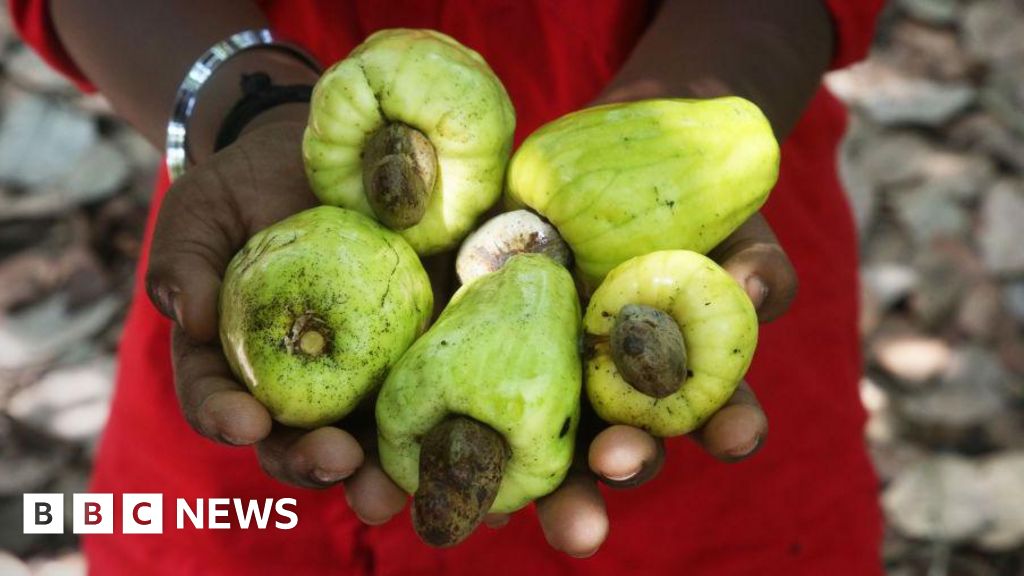
Ghana wants more for its cashews, but it’s a tough nut to crack
- International
- February 5, 2025
- No Comment
- 115
Business reporter, BBC News
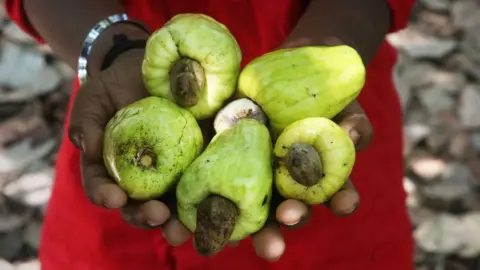 Getty Images
Getty ImagesThe Accra street vendor looks at me, bemused.
I’m trying to establish how the rather flimsy 30g bag of roasted cashew nuts she’s selling, beside a sweltering highway in Ghana’s capital, costs me the equivalent of about 75 cents (60p).
That’s obviously not a lot of money for me, a visitor from the UK, but I’m amazed at the mark up.
The price is at least 4,000% higher than the cost of buying the same weight of raw, unshelled cashews from a Ghanian farmer.
“It’s incredible,” I protest. Yet she doesn’t understand my English, or my reasoning.
The price of the nuts was, after all, printed on the packet. And explaining why I thought it was beyond the pale was never going to be easy.
Ghana is the world’s third-biggest exporter of unprocessed cashew nuts, behind Ivory Coast in first place, and Cambodia in second.
To produce the crop, around 300,000 Ghanaians make at least part of their living growing cashews.
Nashiru Seydou, whose family have a farm in the country’s north-east, some 500 miles (800km) from Accra, is one of them.
He says the work is hard, and unreliable supply chains and volatile wholesale prices make survival difficult.
“We are struggling. We can use the sunlight, the fertile land, to create more jobs,” he says. “I’d be happy if the government comes to our aid and helps support our industry.”
He tells me that he currently gets around $50 for a large 100kg sack of unshelled cashews.
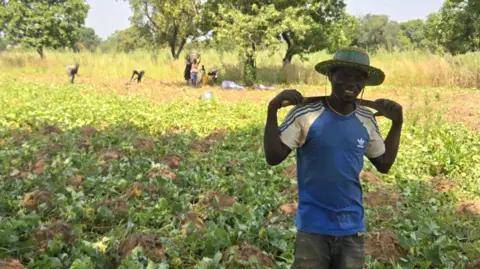
“It’s amazing,” says Bright Simons, an entrepreneur and economic commentator in Accra, who has studied the numbers. “Roasters and retailers buy the nuts from farmers for $500 a tonne, and sell to customers [both at home and abroad] for amounts between $20,000 and $40,000 a tonne.”
As a whole, Ghana grows about 180,000 tonnes of cashews annually. More than 80% is exported, and in raw, unshelled form. This generates some $300m in export revenues, but means that Ghana misses out on the significantly higher returns you get from roasted, ready-to-eat cashews.
Mildred Akotia is one person trying to increase the amount of cashews that are shelled and roasted in Ghana. She is the founder and CEO of Akwaaba Fine Foods, which currently processes just 25 tonnes a year.
Ms Akotia denies any suggestion that she and others like her are price-gouging. The packaging and roasting machinery a western business would automatically use in this industry, she says, is out of reach for her because of the high cost of credit in Ghana.
“If you go to a local bank, it will cost you 30% interest to get a loan,” she complains. “As a manufacturer you tell me how large your margins are that you can afford that kind of interest? We’ve had to rely on what we can get: soft loans from relatives and grants from donor agencies.”
She says that this situation is why less than 20% of Ghana’s cashews are processed locally. The bulk are scooped up and exported to big factories in countries like India, Thailand and Vietnam.
Remarkably, some of those packaged nuts are then exported back to Ghana, where they are sold for the same price as domestically roasted cashews. This is despite the 20,000-mile sea freight round trip, and import costs.
It is a similar picture for rice, which is exported to Ghana from Asia and sold at low prices, despite Ghana also growing the crop itself.
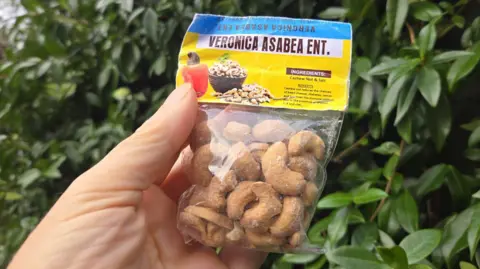
Back in 2016 the Ghanaian government experimented with an export ban on raw cashews in order to encourage homegrown processing. However the policy had to be abandoned within a couple of weeks after uproar from farmers and traders.
Without available cheap loans, it wasn’t possible for sufficient new Ghanaian roasters to enter the market. So the price of raw nuts crashed, and many started rotting for want of a buyer.
More recently there has been talk of increased tariffs on raw cashew exports and bans on exporters purchasing cashews directly from farms.
But all these policy interventions miss a key point, according to Mr Simons. A big challenge for local producers, he says, is to work harder on the basics of doing business, and growing their companies.
“In order to be efficient at this, you need scale,” he says, adding that firms need to promote eating cashews to make it more widespread in the country. “You need a lot of a Ghanaians consuming the nuts, not just a small middle class”.
Prof Daron Acemoglu, a Turkish-American economist, agrees that building a strong local market is important for Ghana’s cashew industry. He was one of last year’s winners of the Nobel Memorial Prize in Economic Sciences, for his work on the struggles facing low-income economies, and in particular their home-grown businesses.
Yet he says that the first priority should be improving access to international markets for processed Ghanaian cashews.
“These firms are dealing with workforces that aren’t properly skilled, they have infrastructures that aren’t working, they are constantly in fear of corrupt officials, or rule changes, and also it’s very difficult to reach foreign markets, he says. “They need the foreign market because the domestic market is small, and their own government has very little capacity [to boost it].”
He also wants to see the Ghanaian government improve the network of roads and railways to ease the cost of transportation.
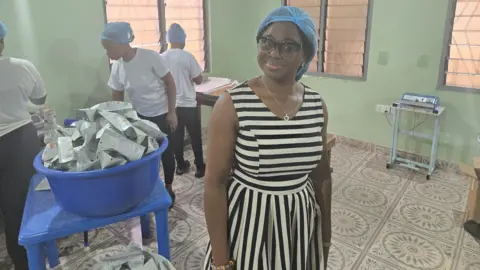
But Mr Simons reckons the onus should now be on Ghanaian businesses themselves, to do the basics to enhance the branding and marketing of cashews. As it is, he says, many of the country’s most enterprising business people are just leaving Ghana for better paid opportunities abroad because of the red tape and cronyism in Ghana are so prohibitive.
“There’s a massive brain drain,” he says. “My theory of why Africa’s economic development has been slow is because we focus too much on the supply side, but the real beauty is in demand, creating a consuming class of cashew-eating enthusiasts, and you don’t have an entrepreneurial class that can create demand transformation.”
He says the same argument applies to Ghana’s other bigger exports, like gold and chocolate, neither of which gets much value-addition within Ghana before getting exported to the West.
Mildred Akotia hopes she might be one of those entrepreneurs to buck the trend. She now wants to build her own logistics arm, to be able to process the cashews direct from the farm gate.
“I have a lot of calls from the UAE, from Canada and America. Currently we can’t meet demand. We can’t get enough kernels to roast.
“There’s a ready market both locally and internationally. My branding is good, my marketing is good. My dream is to give a facelift to Ghanaian processed foods.”
#Ghana #cashews #tough #nut #crack









